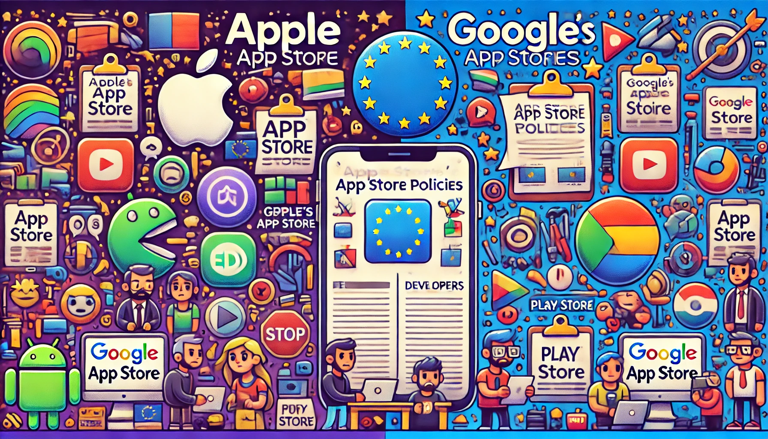In response to the European Union's Digital Markets Act (DMA), both Apple and Google have revised their app store policies, particularly concerning external links and fee structures for developers operating in the EU. While these changes bring the two tech giants' policies closer together, there are key differences that could significantly impact developers. This article explores the nuances of these new guidelines and their broader implications.

Apple’s Initial Acquisition Fee vs. Google’s Initial Acquisition Fee
One of the major changes both Apple and Google have implemented is the introduction of the Initial Acquisition Fee, a charge applied to developers who direct users to make purchases outside of their respective app stores.
- Google’s Initial Acquisition Fee stands at 10% for in-app purchases and drops to 5% for subscriptions after two years. This reduction is designed to incentivize long-term user engagement.
- Apple’s Initial Acquisition Fee is a flat 5% across the board, making it slightly more favorable for developers in the short term. However, the fee applies for the first 12 months after the initial download of the app, contrasting with Google’s 24-month attribution window.
This difference in timeframes means that while Apple’s fees might appear lower initially, Google’s longer attribution window could lead to higher cumulative costs for developers over time, especially for those with high user retention.
Apple’s Store Services Fee vs. Google’s Ongoing Services Fee
Both companies have also introduced ongoing fees related to maintaining their respective app ecosystems, though these fees differ in structure and impact.
- Google’s Ongoing Services Fee is set at 17% for in-app purchases or 7% for auto-renewing subscriptions. After two years, developers can choose to discontinue these services, but they must obtain user consent, adding a layer of complexity to the process.
- Apple’s Store Services Fee under the EU’s alternative business terms is 10%, reduced to 5% for members of the App Store Small Business Program or after the first year of subscription renewals. Developers who opt for Apple’s standard business terms face a higher fee of 20%, though this is similarly reduced for small businesses and long-term subscriptions.
The presence of Apple’s Core Technology Fee—€0.50 per annual install for popular apps—adds another dimension to the cost structure. While Apple claims that 99% of developers won’t pay this fee, it’s an additional consideration for those who meet the threshold.
The Bigger Picture: Developer Impact and Regulatory Scrutiny
One area where Apple seems to be outpacing Google is in its accommodations for small businesses. The App Store Small Business Program offers significant fee reductions, which could make Apple’s ecosystem more attractive to smaller developers. Google, on the other hand, lacks these specific carveouts, potentially making its platform less appealing for smaller players.
However, the overarching issue remains the complexity of these new guidelines. The maze of fees, attribution windows, and service terms creates a challenging environment for developers trying to navigate the EU’s regulatory landscape. Apple’s decision to provide a fee calculator for developers is a step toward mitigating this complexity, but it underscores the convoluted nature of compliance in today’s digital economy.
The European Commission’s response to these changes will be critical in shaping the future of app store regulations. While Apple and Google have both made efforts to align with the DMA, the Commission’s interpretation of these efforts—and the resulting regulatory actions—will determine whether these new guidelines truly foster a fairer, more competitive market or simply add another layer of complexity for developers.
As the dust settles, developers are left questioning not only the motives of Apple and Google but also the role of the European Commission in this ongoing game of regulatory cat-and-mouse. Will these changes lead to a more equitable ecosystem, or are they merely a new set of hurdles for developers to overcome? Only time will tell.